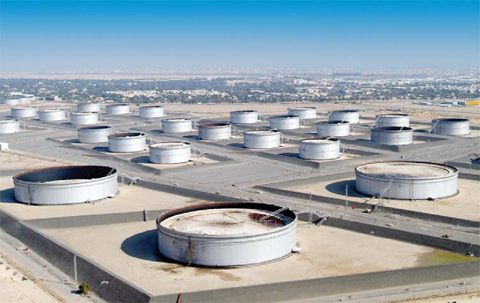SINGAPORE/MANAMA: Oil prices climbed in Asia yesterday after Kuwait said an agreement to freeze output during a producers' meeting this month could still be reached despite conflicting statements by participants. But analysts said the rebound would not likely last owing to a painful supply glut and weak demand caused by the slowing world economy. At around 08:15 GMT yesterday, US benchmark West Texas Intermediate for delivery in May was up $1.03, or 2.87 percent, at $36.90 and Brent crude for June was 72 cents, or 1.90 percent, higher at $38.59.
Both contracts eked out an increase on Tuesday, but prices are still well below the $40 level reached last month following a rally driven by hopes of an agreement during the upcoming April 17 producers' meeting in Doha. Prices dived after Saudi Deputy Crown Prince Mohammed bin Salman said last week his country would only agree to limit output if rival producers, such as Iran, followed suit. But Iran, which has been raising production since the West lifted nuclear-linked sanctions in January, has insisted it should not be the one to cut back.
Key OPEC member Kuwait, however, said a freeze deal could still be reached without Tehran, Bloomberg News reported. It quoted Kuwait's OPEC governor, Nawal Al-Fezaia, as saying that major producers had no option but to reach an agreement and that a freeze could set a floor price. Ric Spooner, chief market analyst at CMC Markets in Sydney, said traders were likely to wait for the results of the meeting before making big bets. "Given the welter of statements... people are probably just going to ignore (the comments) until they get the results of the meeting," Spooner said. Comments by IMF chief Christine Lagarde-that global economic recovery is still "too slow" and "too fragile"-further added to the gloom in the saturated oil market as it was bad news for demand, analysts said.
Inevitable procedures
The Arab Finance Ministers meeting in Manama, Bahrain, have discussed the inevitable procedures and method to be adopted by countries of the region to face the falls in oil prices, Kuwait's Deputy Prime Minister and Minister of Finance and Acting Oil Minister Anas Al-Saleh said.
They addressed papers submitted by the International Monetary Fund (IMF) on the issue, Saleh said yesterday on the sidelines of the 7th session of the Arab Finance Ministers Council and the meetings of the Arab financial institutions. The ministers also discussed each country's experience on countering the falls that hit their budgets, especially one like Kuwait which mainly relies on oil as a source of income.
The topic featured high on the agenda of the meetings of the Arab financial institutions whose revenues declined as a result of the decline in prices, the minister said. He added that the meetings endorsed the budgets of most institutions.
Plummeting prices
Kuwait, like other countries the bulk of whose incomes is derived from oil, currently faces challenges and deficits in its budget for this year and next year, said Masood Ahmed, Director of the International Monetary Fund (IMF) Middle East and Central Asia Department.
The global slump in oil prices has affected Kuwait's economy seen in lower general revenues which in turn have chipped away at the nation's budget, Ahmed said on the sidelines the meeting. Kuwait, he noted, has a long arm in fiscal responsibility over the years, enabling the government at this juncture to set in place reform policies to deal head-on with the new financial and economic realities and to ensure the sustainability of the nation's economic growth.
Further, he opined that, to deal with falling revenues, Kuwait should constrict expenditures and seek alternative sources of revenues and income from non-oil origins. If that tack is followed, he said, the country will enjoy diversification of income and the generation of ample employment opportunities. - Agencies











